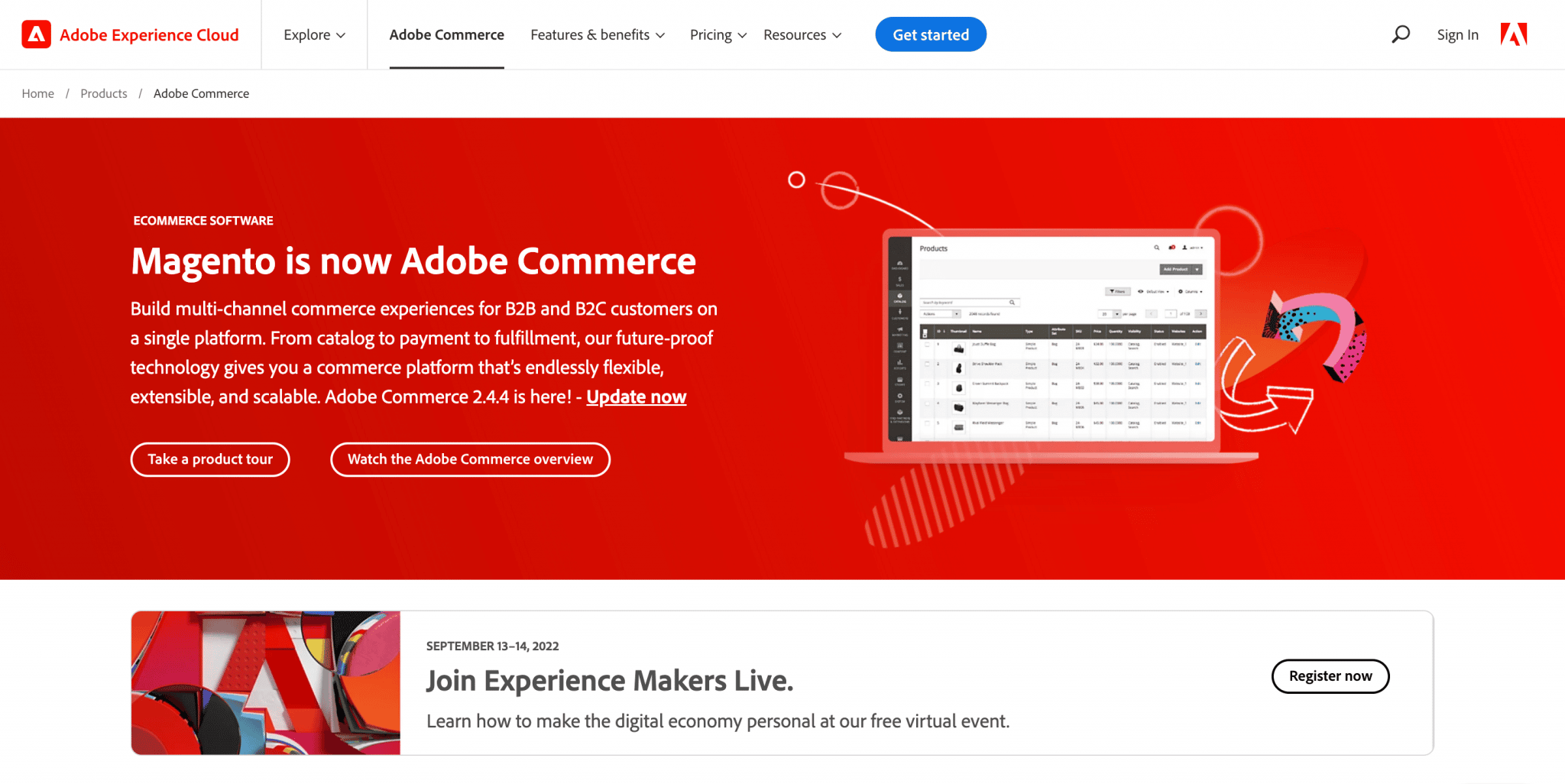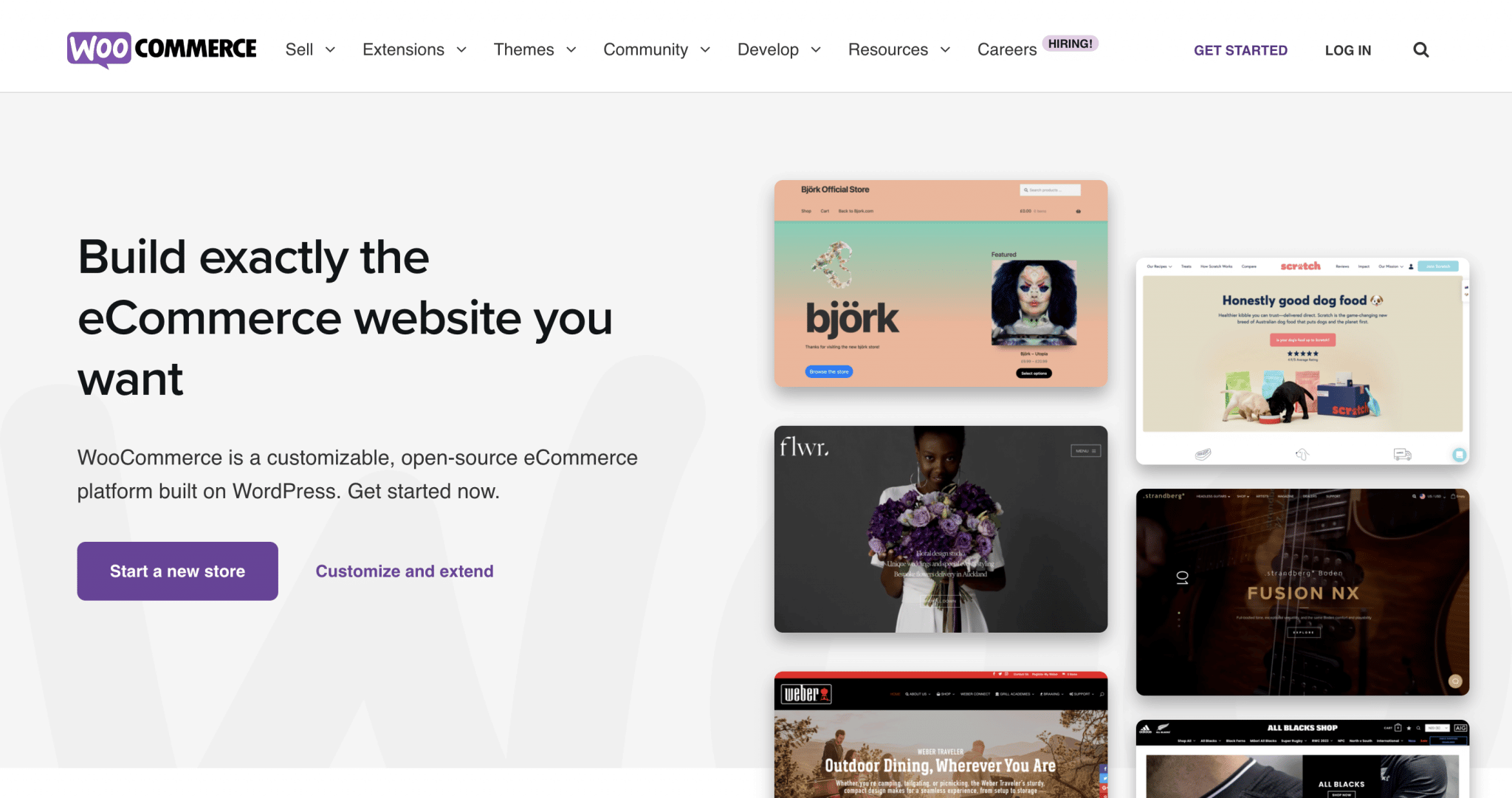
This article contains affiliate links that will allow us to earn commissions without any extra cost to you. Read our full disclosure here.
If you’re reading this article, you’re probably asking yourself this question: Are there other options for me and my business aside from Shopify? The answer is YES!
Here are six popular Shopify alternatives to check out:

OR 10% OFF Every Month When You Use Code: ECOMCREW10
Adobe Commerce (Magento)
Best for big companies with in-house developers
The Adobe-acquired platform is most known for its open source ecosystem, in which you can access the backend and really get to tinker with the littlest details of your site.
With that being said, it’s important that you know how to code–or at least you have people who do. Otherwise, Adobe Commerce might be too complicated for you.
It’s also important to mention that while the software itself is free to download, you will have to pay for the themes, hosting, extensions, etc.
Adobe Commerce Pros
- You get to go all out on customization.
- You have access to plenty of extensions.
- You can choose between cloud- or self-hosted solutions.
Adobe Commerce Cons
- It’s not ideal for beginners. You’ll need to be knowledgeable about coding.
- Because you have a free hand at making your website from scratch, it will be more expensive.
- You have to host the website yourself or through a third party service.
Pricing: You can inquire regarding pricing by filling out this form.
BigCommerce
Best for growing businesses that are ready to scale
One of Shopify’s more popular competitors (and for good reason), BigCommerce manages to offer an excellent suite of features without becoming too advanced.
Also, if you want to improve your site’s rankings, this platform has an excellent SEO integration.
BigCommerce is also ISO/IEC 27001:2013 & PCI DSS 3.2, Level 1 certified, which essentially means online transactions (and sensitive info like credit card details) are safe and protected.
Related reading: BigCommerce vs. Shopify: What’s the Best Option for New Sellers?
BigCommerce Pros
- Regardless of which plan you get, there are plenty of unexpected features to play with.
- Compatible with several payment gateways with no additional transaction fees.
- It’s beginner-friendly with its drag-and-drop Page Builder.
- 24/7 support is available.
BigCommerce Cons
- Free themes are limited.
- If you’re used to Shopify, navigating BigCommerce and its unique features will need some adjusting.
Pricing: You can inquire regarding pricing by filling out this form.
Wix
Best for companies with a limited budget
Like Shopify, Wix is one of the more beginner-friendly options on this list. But that’s not to say its features are limited.
With over 100 templates, a bunch of customizable themes, and a loaded app store, Wix has a lot to offer both beginner and experienced users.
One of its greatest selling points is its pricing. You’ll get a lot of good features for even the cheapest plan. Business plans start at $17/month.
Wix also has artificial design intelligence (ADI), which asks you to fill out a questionnaire and based on your responses, suggests a configuration. Pretty neat, right?
If you’re looking to invest in your website but with a budget to consider, Wix probably has the most value for your money.
Wix Pros
- It’s an easy-to-use website builder with a sleek interface.
- Plans are affordable.
- All Business Plan users get a free domain for a year.
- You get unlimited bandwidth.
Wix Cons
- Contacting support can only be done by calling or through email. No live chat feature.
- Storage space is limited to 50GB for the highest tier Business Plan, and less for lower categories.
- Limited compatibility with payment providers.
Pricing: $17/month for Business Basic, $25/month for Business Unlimited, and $35/month for Business VIP.
WooCommerce
Best for businesses that are used to WordPress
Unlike the other items in this roundup, WooCommerce is a plugin (for WordPress specifically) rather than a standalone platform.
Installing it is as straightforward as can be. All you need is your own domain name and hosting account. Install WordPress and the WooCommerce plug-in. Once it’s activated, you can start!
Since it is only a plugin, expect some limitations. For example, not all themes on WordPress are optimized for WooCommerce, so in that aspect alone, there already are constraints design-wise.
But since it is open source (with a bunch of extensions at your disposal), there is still a lot of room for you to get creative with your website.
Related reading: WooCommerce vs Shopify: Which Platform Is Right for You?
WooCommerce Pros
- It’s completely free!
- If you already have an existing WordPress site, it’s easy to integrate.
- There’s plenty of paid and free extensions to use for your site.
WooCommerce Cons
- Because it is open source, coding can be labor intensive.
- It has limited SEO and integration capabilities.
- They don’t have a 24/7 support team. However, you can submit a ticket through their website.
Pricing: Free! There are paid extensions though.
Volusion
Best for businesses who have a diverse product catalog
This cloud-based platform isn’t as easy to use at Shopify and will entail some level of knowledge in coding, but nevertheless, it is a reliable alternative.
What it lacks in integrations it makes up for in unique features. You can add category pages, experiment with product display options, and highlight items through the Slideshow feature.
The best part of the platform? No additional fees, regardless of payment method.
You can even manage your site while you’re out and about through the mobile app.
Volusion Pros
- There are no additional transaction fees for all payment methods.
- The free themes are great, plus some mobile-friendly ones.
- They have a good mobile app.
Volusion Cons
- Bandwidth is limited.
- Search functionality could be better.
- Features are limited compared to other platforms.
Pricing: $35/month for Personal, $79/month for Professional, and $299/month for Business.
Squarespace
Best for businesses who have aggressive content marketing strategies
If you’re looking to create a website that looks great and gets the job done, Squarespace can do that.
One of Squarespace’s strongest suits is its blogging capabilities. The platform provides optimal space for your content to compliment your products.
In terms of payment channels, Squarespace is limited to PayPal and Stripe, might be an important factor to consider.
Squarespace Pros
- Themes and templates are well done.
- The blog feature is excellent.
- Express checkout is available.
Squarespace Cons
- There aren’t a lot of apps.
- Mobile loading time is significantly slower compared to other platforms.
- Payment methods are limited.
Pricing: $19, $33, $36, and $65/month for Personal, Business, Basic Commerce, and Advanced Commerce, respectively.
Final Thoughts
Shopify may be top of mind when it comes to ecommerce platforms, but it’s important to know that there are other options out there.
You have to ask questions like “Do I want to create a website from scratch or just choose from a selection of premade themes?” and “Do I need all these features or is a “less is more” approach more appropriate?”
At the end of the day, the platform you choose should cater to your business’ needs.
Do you have online stores on these platforms? How do they compare to Shopify? Share your comments with us in the comments section below!










Shopware which recently got a $100 mio funding from Paypal is missing on the list. It‘s tech stack and API approach is way ahead of all other open source solutions. Saying this as a 10+ years Magento user.